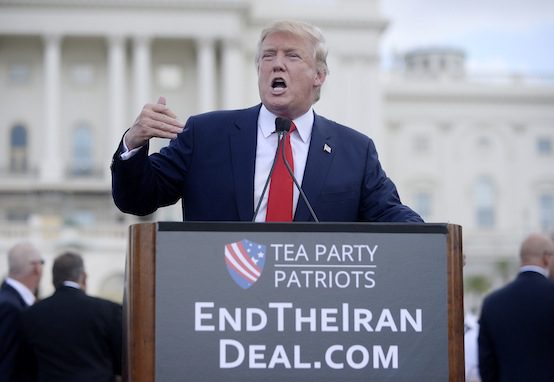The Boundless Bad Faith of Trump’s Iran Policy

Paul Pillar comments on the administration’s Iran obsession and the failure of its bankrupt Iran policy:
No theme in the Trump administration’s foreign policy is more prominent, to the point of having become an obsession, than its effort to isolate and stoke hostility toward Iran, which just observed the 40th anniversary of its revolution. But the “maximum pressure” campaign against Tehran has achieved nothing positive regarding Iranian conduct and has inflicted significant collateral damage on U.S. foreign relations. A fundamentally different approach, one that makes full use of diplomacy, is needed.
Trump’s Iran policy is a good example of what happens when bad faith arguments become the basis for U.S. policy decisions. This is not unique to the debate over Iran and its nuclear program, but it is the typical cynicism that we expect from hawks. The Trump administration’s hostility to the nuclear deal makes no sense if one assumes that they actually care about nonproliferation, but their interest in the nuclear issue is to use it as a bludgeon against Iran and an excuse for ratcheting up tensions rather than seeing it as a problem to be managed responsibly. That is why they reimpose sanctions on Iran for things that it is no longer doing and punish the Iranian people for an issue that has already been resolved. “Maximum pressure” isn’t changing regime behavior and was never going to change it, but then the real point of applying that pressure is simply to cause as much pain as possible in the vain hope of triggering regime collapse. Administration officials won’t openly admit that their goal is regime change, but there is nothing else that it could be.
Despite being the biggest demagogues of the supposed threat from Iran’s nuclear program, Iran hawks have been dead-set against the negotiation of any agreement that could peacefully manage and even eliminate the potential threat. When the nuclear deal succeeded in restricting Iran’s nuclear program, they moved the goalposts and faulted the nuclear deal for its other supposed “flaws,” by which they meant that the deal did not compel Iran to abandon its entire foreign policy and nuclear program all at once. This was not so much a case of making the perfect the enemy of the good as it was one of hating any diplomatic achievement that might deprive them of their pretext for isolation and war. They feigned interest in a diplomatic solution when they thought it wasn’t possible, and then quickly denounced the agreement once it was reached. The supposedly unreachable deal instantaneously became the worst deal of all time (“worse than Munich!”) as soon as it was reached.
Iran hawks told us for years that the regime couldn’t be trusted to honor its side of the bargain, and then even though Iran complied with the deal and the IAEA has now verified that compliance 14 times in a row they told us that compliance didn’t matter because the deal was so terrible. The administration professes to want Iran to behave like a “normal” country, but then attacks them with economic warfare after they have behaved cooperatively on the nuclear issue. Trump’s officials condemn Iran for its roguish behavior and then they make a mockery of international law and norms by reneging on U.S. commitments and penalizing our allies for engaging in legitimate commerce. The Trump administration proved by reneging on the deal that they couldn’t be trusted, but in their bad faith attacks on the deal before withdrawal administration officials and their hawkish allies had already shown how completely untrustworthy they were.